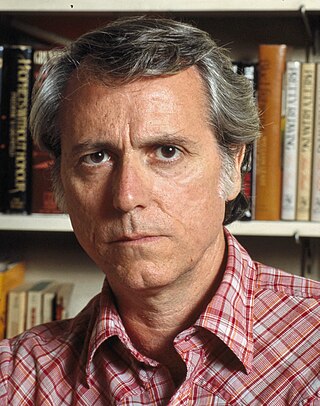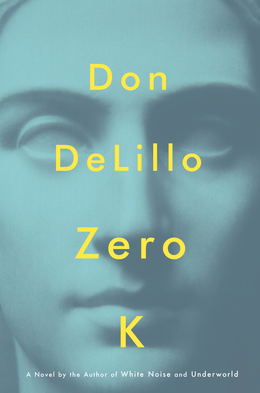
Donald Richard "Don" DeLillo is an American novelist, short story writer, playwright, screenwriter and essayist. His works have covered subjects as diverse as television, nuclear war, the complexities of language, art, the advent of the Digital Age, mathematics, politics, economics, and sports.

Underworld is a 1997 novel by American writer Don DeLillo. The novel is centered on the efforts of Nick Shay, a waste management executive who grew up in the Bronx, to trace the history of the baseball that won the New York Giants the pennant in 1951, and encompasses numerous subplots drawn from American history in the second half of the twentieth century. Described as both postmodernist and a reaction to postmodernism, it examines themes of nuclear proliferation, waste, and the contribution of individual lives to the course of history.

Libra is a 1988 novel by Don DeLillo that describes the life of Lee Harvey Oswald and his participation in a fictional CIA conspiracy to assassinate President John F. Kennedy. The novel blends historical fact with fictional supposition.

White Noise is the eighth novel by Don DeLillo, published by Viking Press in 1985. It won the U.S. National Book Award for Fiction.

Mao II, published in 1991, is Don DeLillo's tenth novel. The book tells the story of a novelist, struggling to finish a novel, who travels to Lebanon to assist a writer being held hostage. The title is derived from a series of Andy Warhol silkscreen prints depicting Mao Zedong. DeLillo dedicated the book to his friend Gordon Lish. Major themes of the book include crowds and the effects of political terrorism. Mao II received positive reviews from critics and won the PEN/Faulkner Award in 1992.

End Zone is Don DeLillo's second novel, published in 1972.

Cosmopolis is a novel by American writer Don DeLillo. His thirteenth novel, it was published by Scribner on April 14, 2003.

A Reader's Manifesto is a 2002 book by B. R. Myers expanded from his essay in the July/August 2001 issue of The Atlantic Monthly magazine. Myers criticized what he saw as the growing pretentiousness of contemporary American literary fiction, especially in contrast to genre fiction.

Alfred A. Knopf, Inc. is an American publishing house that was founded by Blanche Knopf and Alfred A. Knopf Sr. in 1915. Blanche and Alfred traveled abroad regularly and were known for publishing European, Asian, and Latin American writers in addition to leading American literary trends. It was acquired by Random House in 1960, and is now part of the Knopf Doubleday Publishing Group division of Penguin Random House which is owned by the German conglomerate Bertelsmann.

Americana (1971) is American novelist Don DeLillo's first book. DeLillo conceived the novel while traveling through Maine with friends. In 1989, DeLillo revised the text, excising several pages from the original.

Paule Marshall was an American writer, best known for her 1959 debut novel Brown Girl, Brownstones. In 1992, at the age of 63, Marshall was awarded a MacArthur Fellowship grant.

Conan the Barbarian is a 1982 fantasy novel written by L. Sprague de Camp, Lin Carter and Catherine Crook de Camp featuring Robert E. Howard's seminal sword and sorcery hero Conan the Barbarian, a novelization of the feature film of the same name. It was first published in paperback by Bantam Books in May 1982. The first hardcover edition was issued by Robert Hale in 1983, and the first British edition by Sphere Books in April 1988. A later novel with the same title by Michael A. Stackpole was issued by Berkley Books in 2011 as a tie-in with the 2011 remake of the 1982 film.

Amazons is a novel co-written by Don DeLillo, published under the pseudonym Cleo Birdwell in 1980. The subtitle is An Intimate Memoir by the First Woman to Play in the National Hockey League. The book was a collaboration with a former co-worker of DeLillo's, Sue Buck, and represents a commercial, light-hearted effort between his novels Running Dog and The Names. While the book is widely known to have been written by DeLillo, and is technically his seventh novel, it has never been reprinted and he has only once officially acknowledged writing it. Additionally, when Viking was compiling an official bibliography for the Viking Critical Library edition of White Noise, DeLillo asked the publishers that the book be expunged from the list.

Then We Came to the End is the first novel by Joshua Ferris. It was released by Little, Brown and Company on March 1, 2007. A satire of the American workplace, it is similar in tone to Don DeLillo's Americana, even borrowing DeLillo's first line for its title.

1Q84 is a novel written by Japanese writer Haruki Murakami, first published in three volumes in Japan in 2009–10. It covers a fictionalized year of 1984 in parallel with a "real" one. The novel is a story of how a woman named Aomame begins to notice strange changes occurring in the world. She is quickly caught up in a plot involving Sakigake, a religious cult, and her childhood love, Tengo, and embarks on a journey to discover what is "real".

Point Omega is a short novel by the American author Don DeLillo that was published in hardcover by Scribner's on February 2, 2010. It is DeLillo's fifteenth novel published under his own name and his first published work of fiction since his 2007 novel Falling Man.
Black Clock was an American literary magazine that published twenty-one issues over twelve years. Edited by Steve Erickson, the magazine was "dedicated to fiction, poetry and creative essays that explore the frontier of constructive anarchy...Black Clock is audacious rather than safe, visceral rather than academic, intellectually engaging rather than antiseptically cerebral, and not above fun. Produced by writers for writers, Black Clock encourages risk and eschews editorial interference."

The Housebreaker of Shady Hill and Other Stories is a collection of short fiction by John Cheever. Composed of eight short stories, the volume was first published by Harper & Bros. in 1958. Reissued by Hillman/MacFadden in 1961, the works are included in The Stories of John Cheever (1978). The works were originally published individually in The New Yorker.

Lucky and Squash is a 2012 American children's book written by Jeanne Birdsall and illustrated with watercolor paintings by Jane Dyer published by Harper, an imprint of HarperCollins Publishers. The two eponymous characters are dogs based on Birdsall's and Dyer's actual dogs, Cagney and Scuppers, a Boston Terrier and a Tibetan Terrier respectively.

Zero K is a 2016 novel by American author Don DeLillo.



















